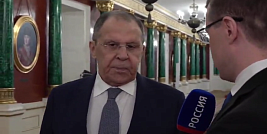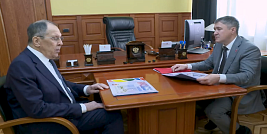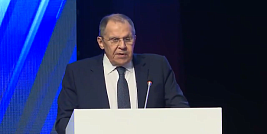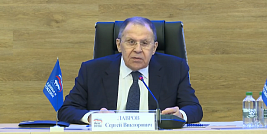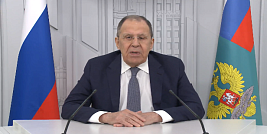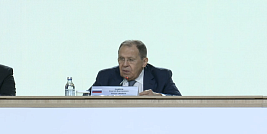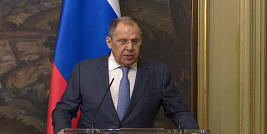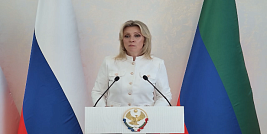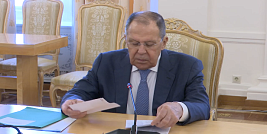Foreign Minister Sergey Lavrov’s remarks at Eurasian international public political hearings on the formation of a contour of equal and indivisible security and cooperation in Eurasia, Perm, May 29, 2025
Mr Yakushev,
Mr Makhonin,
Colleagues,
Friends,
It’s an honour to be invited to speak at such a distinguished forum which has brought together parliamentarians, public figures, and experts from Russia and other Eurasian countries.
I would like to thank the Government of the hospitable Perm Territory and the head of the region, Dmitry Makhonin, for the warm welcome and the professional organisation of the hearings. We highly value the contribution made by the leadership of the All-Russian political party United Russia in convening this forum.
Today, we are addressing the issue of building security architecture across the entire Eurasian space. For Russia - a civilisational state that stretches from the Baltic Sea and the Black Sea to the Pacific Ocean - the importance of building this architecture cannot be overestimated. This need for such architecture is further underscored by the approaching end of centuries-long Western dominance and the advent of a multipolar era. New centres of power, especially in Eurasia, are developing dynamically. All countries on the continent need strong guarantees for peaceful coexistence.
The main threat comes from forces in the West that are attempting to hinder the natural processes of multipolarity. They view these developments as a challenge to their global dominance and are unwilling to relinquish - without a fight - the political, financial, and trade advantages they acquired during the colonial era. Now, they are trying to preserve them through neo-colonial methods under the banner of a “rules-based order.” However, this vision of world order is outdated. It is safe to say that the Euro-Atlantic has lost its status as the engine of global growth. In terms of overall economic indicators, BRICS has surpassed the G7, and the gap continues to widen each year. The centre of economic, trade, and investment activity is shifting to Eurasia - the largest and wealthiest continent, and the cradle of several great civilisations. Life itself compels us to rethink the comprehensive organisation of our shared geographic and political space - starting with its economic foundation - in the spirit of multipolarity.
This very philosophy underpinned President Vladimir Putin’s 2015 initiative to create the Greater Eurasian Partnership, i.e., an integration framework open to all Eurasian countries and associations. As part of its implementation, efforts are underway to align the EAEU development plans with China’s Belt and Road Initiative. Strong links have been established among the EAEU, the SCO, and ASEAN. The CIS is building horizontal ties with the SCO and the CSTO. Eurasian connectivity is being ensured through the creation of transcontinental transport corridors. Among the most significant are the International North–South Transport Corridor, the rapidly developing Northern Sea Route, and the transcontinental trans-Siberian West-East route.
However, the Greater Eurasian Partnership is not limited to the economy, trade, transport, and logistics. It serves as the material foundation for another Russian initiative - the formation of Eurasian security architecture. This initiative was advanced by the President in his address at the Foreign Ministry on June 14, 2024. I’m convinced that had it not been officially proposed, it would have emerged anyway as an objective and historically driven process.
Let me briefly go over these reasons. I have repeatedly said from many lecterns that our Western partners have “written off” the Euro-Atlantic security model that we had been building with them – out of our best intentions - since the late 1960s. They have literally trampled on commitments made at the top level in the OSCE and the Russia-NATO Council: not to ensure their own security at the expense of other members’ security, and not to permit military-political dominance in Europe by any single country, group of countries, or organisation. All of that was destroyed by NATO’s bombing of Yugoslavia in 1999 and by the aggressive eastward expansion of NATO and the EU - an expansion carried out and still ongoing in a clearly hostile manner disregarding Russia’s security interests.
For decades - at least the past 20 years - the West has demanded that our neighbouring countries choose sides and be either with them or with Russia. President Putin warned about the extreme danger of such an approach back in 2007 at the Munich Security Conference.
As everyone knows, in 2008 at the NATO summit in Bucharest, it was solemnly and unequivocally declared that Ukraine and Georgia would become members of this military bloc. In 2014, the Westerners unanimously supported the bloody coup in Kiev orchestrated by the Obama administration, which took place literally the morning after agreements had been signed between the then-president and the opposition - agreements that were guaranteed by the EU, primarily France and Germany. What followed was the rapid creation of an anti-Russia, which was placed under external control and flooded with weapons. Russians and Russian-speaking citizens of Ukraine were declared second-class people and subjected to total discrimination.
Yet again, the EU’s complete inability to honor agreements was demonstrated by the shameful position of Paris and Berlin, which, together with Kiev, sabotaged the Minsk Package of Measures concluded at Russia’s initiative and approved by a resolution of the UN Security Council. The signatories to these agreements, German Chancellor Angela Merkel and President François Hollande, and with them the then President of Ukraine Petr Poroshenko, later admitted that they did not intend to implement this document, that Kiev needed the Minsk agreements as a respite to supply Ukraine with new weapons for the war against Russia.
The Europeans are pursuing the same goal now as well, when Paris and Berlin, led by Emmanuel Macron and Friedrich Merz, together with Vladimir Zelensky are hysterically demanding that we agree to an immediate ceasefire without any preconditions. As they say, thank you for the invitation. We have already tried this and we can read your mind.
All Russian proposals to strengthen Euro-Atlantic security equal to all, including the initiative to conclude a legally binding treaty in this area that was introduced way back in 2008, have been rejected by members of NATO and the European Union. The same fate also befell the proposals we made in December 2021 on what steps we could take to meet the West. I would remind you that President Putin advocated concluding a treaty with the United States and an agreement with NATO on legally binding security guarantees for all. If these documents were adopted and the West gave up its geopolitical expansion to the East, Russia would not have to conduct the special military operation in Ukraine to protect its legitimate interests in full compliance with the principles of the United Nations Charter and the above-mentioned agreements at the highest level in the OSCE.
Regrettably, life seems to have hardly taught our Western neighbours anything at all. After the special military operation began, they went on with a systematic militarisation of the Kiev regime, prohibited it from making peace on terms of going back to the neutral, non-bloc and non-nuclear status, dragged previously neutral Finland and Sweden into NATO, and continue to ratchet up provocative military drills both on land and at sea near our borders.
This dangerous development is unfolding in the absence of any unifying regulatory and institutional framework on the Eurasian continent that would allow for solving security issues collectively and jointly. Africa has a continent-wide organisation – the African Union, Latin America has CELAC, whereas Eurasia so far lacks such a continent-wide association. Clearly, the OSCE cannot be taken for one because it does not span the entire continent and, crucially, the West has turned it into a political appendage of NATO and the EU, as it earlier did with the Council of Europe. In fact, by signing an agreement with the North Atlantic Alliance two years ago, the EU has virtually become its extension in the military political dimension.
However, NATO still wants more. At the 2022 summit in Madrid, they declared indivisible security in the Euro-Atlantic region and the “Indo-Pacific region” which had never existed and which NATO made up so as to drag India into their anti-China schemes.
We are being told that NATO is a defensive alliance. A couple of years ago, when the advance to the “Indo-Pacific region” was announced, the then NATO Secretary General, Jens Stoltenberg, was asked at a news conference as to why NATO was advancing outside its member-states’ territory, because the alliance used to claim that it was defensive and its objective was to protect the territories of its members. Jens Stoltenberg said nonchalantly that NATO’s priority is still to protect its member-states’ territories, however, they are now facing threats from the Far East, the South China Sea, and the Taiwan Strait, therefore, to curb these threats (which are 10,000 kilometres from the nearest NATO member country), the alliance is pushing its infrastructure to the Far East. In truth, it is being done to contain China and Russia.
The United States is actively constructing exclusive military and political frameworks involving regional participants such as Japan, the Republic of Korea, and the Philippines – the latter of whom they are quite literally attempting to extricate from ASEAN, thereby undermining the foundational integrity of the open regional security architecture developed over decades around the central role of the Association.
A military-political association with a nuclear component, AUKUS (Australia, the United Kingdom, and the United States), has been constituted, with efforts underway to involve Japan in specific areas of collaboration. When the Quadrilateral Security Dialogue, known as QUAD (Australia, India, the United States, Japan), was established, assurances were provided that it would refrain from engaging in military affairs. At that juncture, we engaged in discussions with our Indian counterparts, who emphasised that their interest in joining this “Quad” was confined exclusively to trade, economic, and other peaceful domains of collaboration. In practice, however, the QUAD nations are already endeavouring – and with notable persistence – to organise naval exercises, albeit not under the QUAD’s banner, yet, as the saying goes, “all together – the four of them.”
I am confident that our Indian friends perceive this provocation with perfect clarity. Regarding India and NATO’s anti-China initiatives in Eastern Eurasia, I wish to reaffirm our earnest interest in promptly resuming the work of the RIC trilateral format – Russia, India, and China – which was instituted many years ago on the initiative of Yevgeny Primakov and has since convened over twenty ministerial meetings, not only at the level of foreign ministers but also involving the leaders of economic, trade, and financial institutions from the three nations. Now that India and the People’s Republic of China are reaching an understanding on de-escalating tensions along their shared border, the moment has arrived to revitalise RIC.
The United States is intensifying the nuclear aspect of its military collaboration with both Seoul and Tokyo. Meanwhile, the DPRK is under increasing pressure from the West. Consequently, the already fragile security situation on the Korean Peninsula – and across Eastern Eurasia as a whole – continues to deteriorate.
In Southern Eurasia, the situation in the Middle East is evolving dramatically. This strategically crucial region has been driven to the brink of destabilisation by the West. While the United States occasionally voices some criticism of Israel, it unconditionally supports Tel Aviv’s efforts to extinguish all prospects and aspirations for the establishment of a Palestinian state – in defiance of the UN resolutions adopted as far back as 1948, which envisaged the interconnected creation of both Israel and Palestine.
What is transpiring in the Gaza Strip defies comprehension and description. Alongside our Arab friends and the overwhelming majority of nations, we insist that the bloodshed in Gaza must cease immediately. If we examine the statistics following the terrorist attack of October 7, 2023 – which we unequivocally condemned – we must also reject and equally condemn the measures Israel has taken in response, which amount to another violation of international humanitarian law: the collective punishment of a civilian population. The figures speak for themselves: in the year since that attack, approximately 45,000 Palestinian civilians have been killed in Gaza. That was the figure at the time; now it is far higher. This exceeds by 50 percent the number of civilian casualties on both sides over ten years of conflict in Eastern Ukraine from 2014 to 2024. In just one year –50 percent more than in a decade. This is now the greatest tragedy of the region.
Elsewhere in the southern part of our continent, Afghanistan – four years after NATO’s ignominious retreat – witnesses the North Atlantic Alliance once more seeking new points of entry into the country, actively courting our friends, allies, and strategic partners in Central Asia in an attempt to impose upon them its well-known ultimatum: “Choose whose side you are on – Russia’s or ours.” If we turn to the northern reaches of the continent, we observe blatant attempts to militarise the Arctic, with NATO searching for pretexts to establish its infrastructure there.
Clearly, these unfavourable dynamics call for a matching conceptual and practical response. We are convinced that most other Eurasian countries, which cannot be satisfied with this state of affairs, think the same. I would like to emphasise that we are not interested in eternal confrontation with anyone. Our interest lies in ensuring reliable security, stability, and equal conditions for development for all countries. We are convinced that only this fair approach has a right to exist. Overlapping or close positions allow us to hope for starting a broad continent-wide discussion on specific ways to shape the Eurasian security architecture.
Strengthening bilateral and multilateral partnership and alliance mechanisms are part of the process. Notably, the first steps towards this end have been taken. An intergovernmental treaty on security guarantees has been concluded with Belarus, and bilateral treaties on comprehensive partnership, including in the sphere of security, have been signed with the DPRK and Iran. The Collective Security Treaty, which formed the CSTO, continues to function effectively. Cooperation on these issues is underway in the CIS and the SCO.
Security in Eurasia is gradually gaining centrality in our political and analyst/academic dialogue with China. In this work, we rely primarily on the fact that Russia’s vision of the future security architecture in Eurasia is in harmony with the Global Security Initiative put forward by the President of the PRC in February 2023, which highlights the need to identify and eliminate the root causes of all and any conflict. This is a systematic approach that we fully share. We have repeatedly emphasised that eliminating the underlying causes of conflicts should underlie the settlement in Ukraine, as well as all other complex issues with a long history, including Taiwan’s full reunification with its historical homeland, mainland China.
Multilateral associations - the CSTO, the CIS, the SCO, and ASEAN, which I mentioned earlier - play an important role in building continental architecture. The Gulf Cooperation Council is also a promising association. There are interaction mechanisms in South Asia as well. The executive bodies of many of these regional entities have already concluded horizontal agreements. Russia is supportive of this dynamic. I would also like to mention the Conference on Interaction and Confidence Building Measures in Asia, which was created on the initiative of the first President of Kazakhstan. There is talk of transforming it into an organisation. We are active participants. We believe that this work should be given not just an Asian, but a Eurasian dimension.
In our work, we are not shutting the door close to a dialogue with the countries of continental Europe. They, too, can participate in creating a new architecture, provided they renounce confrontational and selfish policies. We note the interest in the Russian initiative on the part of Hungary, Slovakia, Türkiye, and Serbia, as well as the Republika Srpska within Bosnia and Herzegovina.
When, 55 years ago, the idea of convening a Conference on Security and Cooperation in Europe was discussed on the initiative of the Soviet Union, Western European countries demanded that the United States and Canada be part of the process as a condition for their participation in the talks. After some deliberation, the Soviet leadership agreed. However, the Euro-Atlantic security model has discredited itself and is being kept afloat artificially. It appears anachronistic in the current circumstances. We believe that President Donald Trump and his associates’ remarks to the effect that Europeans must guarantee Europe’s security themselves correctly capture the spirit of the times.
And here is another seminal reminiscence: almost ten years passed between the moment the idea of convening a pan-European meeting was floated and the time Helsinki Summit was held in 1975. Now, too, we are at the beginning of a long journey. It is gratifying to know that since 2023, Eurasian security has taken the central stage at the annual international conference in Minsk, which, at the initiative of Belarusian President Alexander Lukashenko, is attended by a wide range of representatives of governments and the academic community of Eurasian countries. I took part in the first and second conferences and consider this initiative of our Belarusian friends to be very useful and promising. The third conference will be held in October. We are taking part in serious preparations for this forum.
We support Belarus’ proposal in this context to develop a Eurasian Charter of Diversity and Multipolarity in the 21st Century. We believe that it should provide the political and legal basis for a continent-wide architecture. We hope that the Charter will reflect the common norms of state-to-state relations in a multipolar world, based, of course, on the principles of the UN Charter in their entirety and interconnection.
I would like to close by once again expressing my support for United Russia’s idea to launch inter-party consultations on the architecture of Eurasian security and to hold today’s productive hearings. I believe that, among other things, this will help unlock the potential of party, parliamentary, and public diplomacy and improve mutual understanding with our country’s international partners.
I wish you every success in your work.
